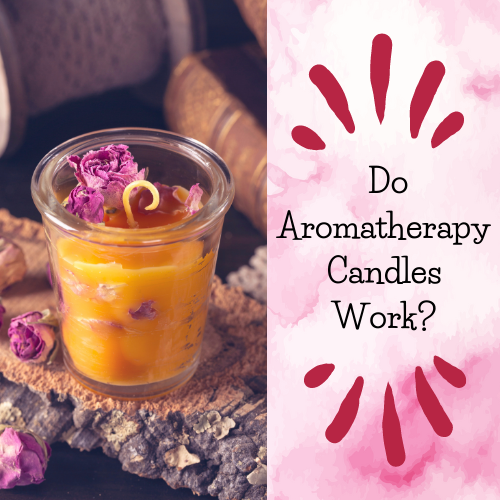Scent has a powerful effect on the brain. When we smell something, the odor molecules travel through the nose and bind to receptors in the olfactory epithelium, located at the back of our nasal passage. From there, signals are sent to an area called the olfactory bulb in the brain. This is where scent processing occurs and where our memories associated with each smell are stored.

Do Aromatherapy Candles Actually Work?
Aromatherapy candles can have a relaxing and soothing effect on the mind and body, but their effectiveness can vary depending on the individual and the specific scent used.
 |
Sense of Smell and the Brain
The olfactory bulb is connected to two other areas of the brain: The amygdala and hippocampus. These areas are involved with emotional processing, memory formation, and other cognitive functions. When a scent molecule binds to one of these receptors in the olfactory bulb, it triggers activity in both areas of the brain- giving us an emotional reaction or bringing up a related memory. This is why certain smells can evoke powerful emotions or nostalgic memories from our pasts.
Let’s take the scent of roses for an example. You might have fond memories of a rose garden at your grandparents’ home. The scent of roses might trigger happy memories associated with spending time there—the way your grandmother's face would light up when you presented her with a bouquet of freshly picked roses. You might also remember the way the roses looked in the bright sunshine, with their petals a deep, rich red.
On the flip side, roses are a traditional flower for funerals, particularly in the form of a casket spray or a sympathy arrangement. They are often chosen for their symbolism of love and grief. Someone else might associate the scent of roses with the death of a loved one and become sad every time they caught the scent.
Even without having a memory associated with a particular smell, the chemistry of essential oils affects us. Certain essential oils, such as lavender, are believed to have a calming effect and can help reduce stress and anxiety.
The scent of citrus essential oils, such as grapefruit, has been shown to have an energizing effect on the brain. This scent has been found to improve mood, reduce stress and anxiety, and increase feelings of energy and alertness. Some studies have also suggested that citrus scents may have a positive impact on memory and cognitive function. These effects are thought to be due to the presence of certain compounds in citrus essential oils, such as limonene and linalool, which have been found to have a calming and uplifting effect on the brain.
Herbal Scents
If you have aromatherapy candles that don’t work for you, the reason may be that the essential oil used is not quality or that it doesn’t contain essential oil at all. Many commercial candles contain synthetic fragrances, which can produce harmful fumes when they burn. It is advisable to use natural and pure candles made of beeswax or soy wax. Ensure that there’s a quality essential oil being used and not just a fragrance oil.
To determine if a candle contains a quality essential oil, you can look for a few key indicators:
- Check the ingredient list: A quality essential oil candle should list the essential oil(s) used in the ingredients. Avoid candles that simply list "fragrance" or "parfum" as these can contain synthetic fragrances.
- Look for certifications: Candles made with essential oils may carry certifications such as USDA Organic or Non-GMO Project Verified.
- Research the brand: Look up the brand and see if they have a good reputation for using quality essential oils in their products.
- Smell the candle: When you light it and smell the candle, the scent should be true to the essential oil it is supposed to be. Avoid any candle that have artificial fragrance.
- Price: Quality essential oils can be expensive, so if a candle is very cheap, it may be using lower quality oils or synthetic fragrance.
By keeping these points in mind, you should be able to identify a quality essential oil candle.
You might also like
Best Diffuser Essential Oils for StressWhat are the best diffuser essential oils for stress? Let's look at a variety...
Natural PerfumeDo you know that 95 percent of the ingredients used in perfume are derived fr...












 Why Eat Fermented Foods?on 10/23/2022
Why Eat Fermented Foods?on 10/23/2022
 Milk Bath Secretson 10/05/2022
Milk Bath Secretson 10/05/2022
 Detox Bath Recipeon 10/01/2022
Detox Bath Recipeon 10/01/2022
 PMS Gummy Vitaminson 09/25/2022
PMS Gummy Vitaminson 09/25/2022



Comments
@Veronica Thank you commenting! I hope your sense of smell never leaves you.
I am a great believer in aromatherapy and candles.
10 to 20 years before a Parkinson's disease diagnosis, the sense of smell declines.
I have room sprays, candles and oils and I always wear perfume daily.
At bedtime, I use a lavender pillow spray too.
ty for this lovely writing.